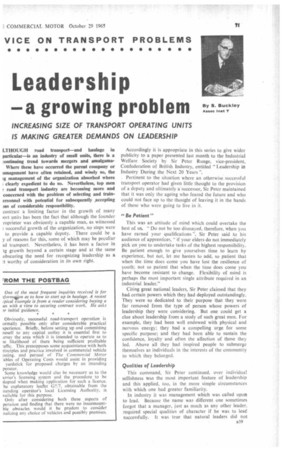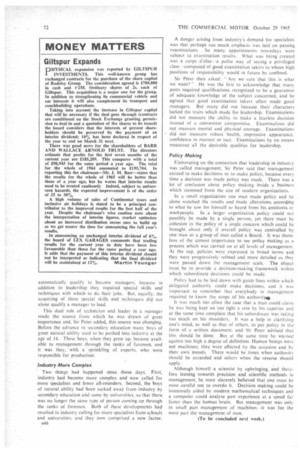Leadership
Page 73

Page 74

If you've noticed an error in this article please click here to report it so we can fix it.
a growing problem
INCREASING SIZE OF TRANSPORT OPERATING UNITS IS MAKING GREATER DEMANDS ON LEADERSHIP
LTHOUGH road transport—and haulage in particular—is an industry of small units, there is a :ontinuing trend towards mergers and amalgama Where these have occurred the parent company or tanagement have often retained, and wisely so, the ig management of the organization absorbed where clearly expedient to do so. Nevertheless, top men ! road transport industry are becoming more and concerned with the problem of selecting and trainersonnel with potential for subsequently ,accepting ms of considerable responsibility.
contrast a limiting factor in the growth of many Port units has been the fact that although the founder roprietor was obviously a capable man, as witnessed ; successful growth of the organization, no steps were to provide a capable deputy. There could be a y of reasons for this, some of which may be peculiar id transport. Nevertheless, it has been a factor in ig growth beyond a certain stage and at the same obscuring the need for recognizing leadership as a :t worthy of consideration in its own right.
Accordingly it is appropriate in this series to give wider publicity to a paper presented last month to the Industrial Welfare Society by Sir Peter Runge, vice-president, Confederation of British Industry, entitled "Leadership in Industry During the Next 20 Years ".
• Pertinent to the situation where an otherwise successful transport operator had given little thought to the provision of a deputy and ultimately a:successor, Sir Peter maintained that it was only the ageing who feared the future and who could not face up to the thought of leaving it in the hands of those who were going to live in it.
"Be Patient"
This was an attitude of mind which could overtake the best of us. Do not be too dismayed, therefore, when you have earned your qualifications ", Sir Peter said to his audience of apprentices.," if your elders do not immediately pick on you to undertake tasks of the highest responsibility. Be patient enough to give yourselves time to learn by experience, but not, let me hasten to add, so patient that when the time does come you have lost the resilience of youth; not so patient that when the time does come you have become resistant to change. Flexibility of mind is perhaps the most important single attribute required in an industrial leader."
Citing great national leaders, Sir Peter claimed that they had. certain powers which they had deployed outstandingly. They were so dedicated to their purpose that they were far removed from the type of person whose powers of leadership they were considering. But one could get a clue about leadership from a study of such great men. For example, they had been well endowed with physical and nervous energy; they had a compelling urge for some specific purpose; and they had been able to sustain the confidence, loyalty and often the affection of those they led. Above all they had inspired people to submerge themselves as individuals in the interests of the community to which they belonged.
Qualities of Leadership This command, Sir Peter continued, over individual selfishness was the most important feature. of leadership and this applied, too, in the more simple circumstances with which one had greater familiarity, In industry it was management which was called upon to lead. Because the name was different one sometimes forgot that a manager, just as much as any other leader. required special qualities of character if he was to lead successfully. It was true that natural leaders did not
automatically qualify to become managers, because in addition to leadership they required special skills and techniques with which to do their jobs. But, equally, the acquiring of these special skills and teChniques did not alone qualify a manager to lead.
This dual role of technician and leader in a manager made the source from which he was drawn of great importance and, Sir Peter added, this source was changing. Before the advance in secondary education many boys of great natural ability used to be pushed into industry at the age of 14. These boys. when they grew up, became available to management through the ranks of foremen, and it was they, with a sprinkling of experts, who were responsible for production.
Industry More Complex Two things had happened since those days. First, industry had become more complex and now called for more specialists and fewer all-rounders. Second, the boys of natural ability had been sucked away from industry by secondary education and some by universities, so that there was no longer the same type of person coming up through the ranks of foremen. Both of these developments had resulted in industry calling for more specialists from schools and universities, and they now comprised a new factor.
a40 A danger arising from industry's demand for specialists was that perhaps too much emphasis was laid on passing examinations. So many appointments nowadays were subject to examination results. What was being created was a corps clelite—a polite way of saying a privileged class—composed of good examination takers to whom high positions of responsibility would in future be confined.
Sir Peter then asked: "Are we sure that this is what we want?' He was the first to acknowledge that many posts required qualifications recognized to be a guarantee of adequate knowledge of the subject concerned, and he agreed that good examination takers often made good managers. But many did not because their characters lacked the traits which made for leadership. Examinations did not measure the ability to make a fearless decision instead of a convenient compromise. Examinations did not measure mental and physical courage. Examinations did not Measure robust health, impressive appearance. confidence in manner or tact. Examinations by no means measured all the desirable qualities for leadership.
Policy Making Elaborating on the contention that leadership in industry was called management. Sir Peter said that management existed-to make decisions or to make policy, because every time a decision was made policy was made. There was a lot of confusion about policy making inside a business which stemmed from the size of modern organizations.
In a small organization one man made policy and he alone watched the results and made alterations accorqing to what he saw for himself or heard from his assistants or workpeople. In a larger organization policy could not possibly be made by a single person, yet there must be , cohesion in the policy of a. single concern which could be brought about only if overall policy was controlled, by one man or a group of men called a Board. It was therefore of the utmost importance to see policy making as a process which was carried on at all levels of management. At the top, policies were expressed in broad terms and they were progressively relined and more detailed as they were passed down the management scale. The object must be to provide a decision-making framework within which subordinate decisions could be made.
Policy had to be laid down with guide lines within which delegated authority could make decisions, and it was important to remember that everybody in management required to know the scope of his authority.
It was much too often the case that a man could claim he was being kept on too tight a rein by his superior and at the same time complain that his subordinate was taking too much on his shoulders. It was a help in clarifying one's mind, as well as that of others, to put policy in the' form of a written document, and Sir Peter advised that this should be done. But at the same time he warned against too high a degree of definition. Human beings were not machines: they were affected by the occasion and by their own moods. There would be times when authority should be exceeded and others when the reverse should apply.
Although himself a scientist by upbringing, and therefore leaning towards precision and scientific methods in management, he most sincerely believed that one must he most careful not to overdo it. Decision making could be immensely aided by modern mathematical techniques and a computer could analyse past experience at a speed far faster than the human brain. But management was only in small part management of machines—it was for the most part the management of men.




















































































































